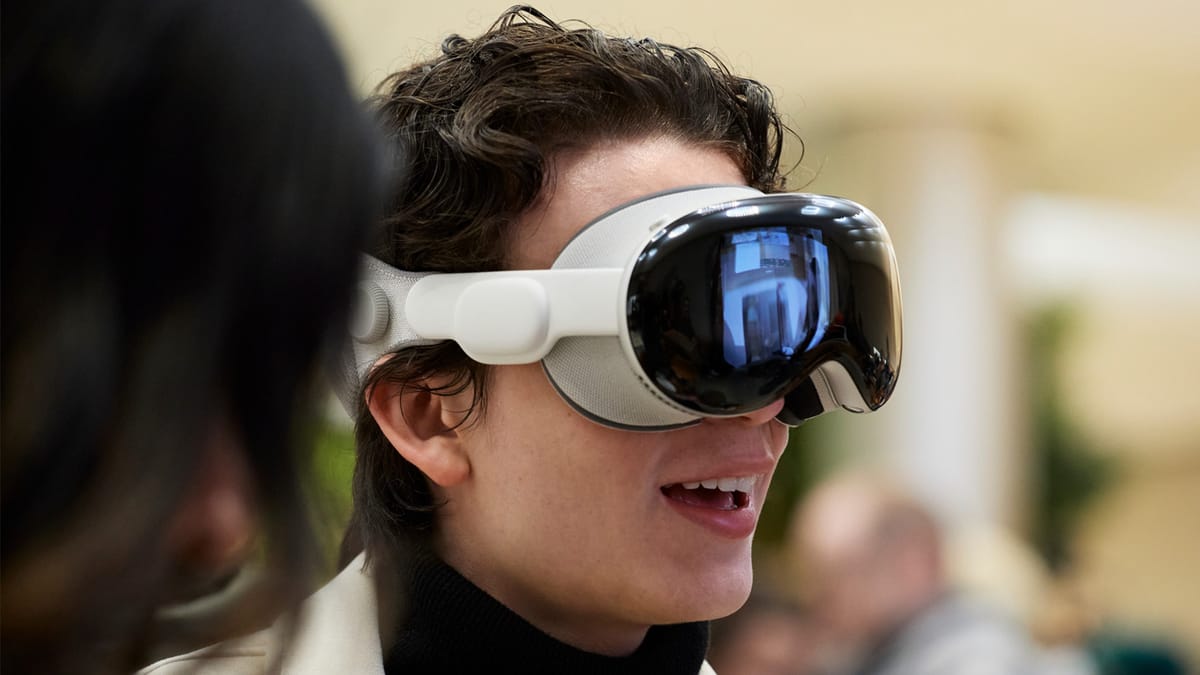- cross-posted to:
- technology@lemmy.ml
- cross-posted to:
- technology@lemmy.ml
As someone who’s been using apple devices for a long time, this pretty much summarizes one of my biggest concerns with the APV. The other being expensive, proprietary, and software-locked lens inserts. (Basically creating a proprietary tax for people with poor vision who want to be involved with spacial computing, antithetical to Apple’s accessibility efforts.)
I haven’t seen anything about the lenses being software locked. Who has reported that?
That said - they are $100 to $150, which isn’t terrible as far as glasses go. There are a lot of weird things with the Vision Pro, but as a glasses wearer, that price range actually feels reasonable to me. That’s Warby Parker pricing.
I was hoping for free :( BUT $150 for Zeiss lenses is pretty ok price wise. (especially when we are complaining about $150 on top of a $3500 device)
I could wear contacts if I wanted to, but glasses look good on me and hide a scar that I have on my nose and eye. I keep thinking that I should probably just do a Drew Carey. Get contacts and put non prescription lenses in my frames.
Glasses can be an inconvenience with vr glasses, ski goggle, helmets, face masks, night driving, etc.
Honestly, I think contacts are the best option. The Zeiss lenses move the headset slightly heavier and worse move it further away from your face creating a lever action amplifying the weight issue.
You can still wear glasses. Just don’t put a prescription in them.
Personally I love my glasses and have never tried contacts, but I think I’ll switch to contacts when this product category is more mature.
Can you do laser correction? If so, that seems even better than the contacts situation.
LASIK is a great option, especially if you’re younger. A lifetime of contacts and glasses adds up.
There’s a calibration process that takes place after a set of Zeiss lenses are inserted and the code scanned. My concern is that this calibration process will likely not be triggered for any insert not made by Zeiss. It may not be a hard software lock, but it would suck if your AVP just didn’t work as well just because you didn’t buy from the people Apple wants you to buy from, even though it probably could anyway.
Ahh. That makes sense. I just watched the pairing video about them. I’m curious about how this works.
https://youtu.be/Xs5a9G6NynQ?si=KgY3Z54Di51aaQ2G
Here’s my guess. The circular QR code contains the prescription, and the lenses contain NFC. When a set of lenses attach, NFC tells the device to pair the prescription, lenses and device together.
Doing that would allow a future OS update to support multiple users accounts with multiple lenses. The Vision Pro would auto-switch to a different calibration when different household user’s lenses were dropped in.
If that’s the case, yeah, this might not be super friendly to other lens manufacturers. That said, given the price of lenses and frames I doubt anyone would be willing to sell these things for under $50. And if I’m going to blow 4 grand on a thing, I’ll probably just eat the extra 50-100 bucks. Heck, the cash back from my credit card would cover the lenses for a purchase this big.
Here is an alternative Piped link(s):
https://piped.video/Xs5a9G6NynQ?si=KgY3Z54Di51aaQ2G
Piped is a privacy-respecting open-source alternative frontend to YouTube.
I’m open-source; check me out at GitHub.
Apple has always had a walled garden on iOS and that didn’t stop them from becoming a giant in the US. Most people are fine with the App Store and don’t care about openness or the ability to do whatever they want with the device they “own.” Apple would probably love to have a walled garden for Macs as well, but knows that ship has sailed. Trying to force “spatial computing” (which this article incorrectly says was an Apple invention, it’s not Microsoft came up with that term for its hololense) on everyone is a great way to move to a walled garden for all your computing, with Apple taking a 30% slice of each app sale. I doubt the average Apple user is going to complain about it either so long as the apps they want to use are on the App Store.
I think the bigger problem is we’re in a world where most people, especially the generations coming up, want less screens in their life, not more. Features like “digital well-being” are a market response to that trend, as are the thousands of apps and physical products meant to combat screen addiction. Apple is selling a future where you experience reality itself through a screen, and then you get the privilege of being up to clutter the real world with even more screens. I just don’t know that that is a winner.
It’s funny too because at the same time AI promises a very different future where screens are less important. Tasks that require computers could be done by voice command or other minimal interfaces, because the computer can actually “understand” you. The Meta Ray-Ban glasses are more like this, where you just exist in the real world and you can call on AI to ask about the things you’re seeing or just other random questions. The Human AI pin is like that too (doubt it will take off, but it’s an interesting idea about where the future is headed).
The point is all of these AI technologies are computers and screens getting out of your way so you can focus on what your doing in the real world, whereas Apple is trying to sell a world where you (as the Verge puts it) spend all day with an iPad strapped to your face. I just don’t see that selling, I don’t think anybody wants that world. VR games and stuff are cool because you strap in for a single emersive experience, and then take the thing off and go back to the real world. Apple wants you spending every waking moment staring at a screen, and that just sounds like it would suck.
It’s funny too because at the same time AI promises a very different future where screens are less important. Tasks that require computers could be done by voice command or other minimal interfaces
Apple seems to be the only major tech company that still believes in that future. Microsoft has killed Cortana entirely and all of their AI work is now focused on enhancing ordinary every day computing, Google and Amazon have both been cutting features and laying off staff for their voice assistants. Which means right now, the only serious entrants in that space are Apple and a bunch of startups.
From what I can see, Vision OS is perfectly suited to it. You can go about your day without any computing, ask your voice assistant a question, see the answer, dismiss it, and move on, without taking devices out of your pocket or sitting down at a desk. What’s clearly not ready for that is the hardware - it’s too big, too heavy, the battery life isn’t good enough, the viewing angle is too narrow, too expensive, etc etc.
The other thing missing is Apple’s voice assistant is clearly falling behind. It has always worked well for simple commands but that doesn’t cut it any more. Tim Cook has said they have more to announce on that front “later this year” and it’s worth noting that Apple has bought 21 AI companies in the last several years. All they have to show for that is the ability to search for “dog” in your photo library. Clearly they’re working on something more meaningful and it seems pretty obvious that a better Siri is going to ship sooner rather than later.
My best guess is Siri has fallen behind because all of their best staff are working on something to replace it.
Apple Vision Pro, I think, is two products:
- An immersive content viewing experience - movies, photos, games, etc
- An experimental new computing platform that developers can potentially use to build great things
The second won’t really pay off until the hardware is better. But the first is good enough justification to ship this product now, even though it’s nowhere near achieving it’s potential.
Interesting perspective! I think your right in a lot of ways, not least that it’s too big and heavy now. I’d also be shocked if the next iPhone didn’t have an AI powered siri built in.
I guess fundamentally I am skeptical that we’re all going to want a screens around us all the time. I’m already tired of my smart watch and phone buzzing me with notifications, do I really want popups in my field of vision? Do I want a bunch of displays hovering in front of my while I work? I just don’t know. It seems like it would be cool for a week or so, but I feel like it’d get tiring to have a computer on your face all day, even if they got the form factor way down.
Apple has always had a walled garden on iOS and that didn’t stop them from becoming a giant in the US. Most people are fine with the App Store and don’t care about openness or the ability to do whatever they want with the device they “own.”
Uh. No. In the consumer space, maybe, but in the business and professional world, Windows essentially still has a monopoly.
And therein is the crux of the argument of the author: the vision pro is not marketed, or priced for the consumer market. It is marketed, and priced for the business world, and compromises on build immensely, by failing to provide consumers with consumable content and failing to give professionals the general purpose computing needed for actual productivity (developers, developers, developers!).
The author says that because of this compromise, it will likely fail in that segment (the only commercially viable segment at that price point) for the same reason that Mac’s never captured some of Window’s market share (hipster design studio full of Macs and iPads are loud and proud, but still insignificant market share).
Full stop the problem is the weight and comfort. These things are just uncomfortable to wear and I am flabbergasted that Apple is somehow surprised that their glass and metal ski goggles are uncomfortable to wear for any period of time.
Sure, but that’s not what this article is about.







